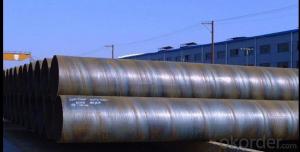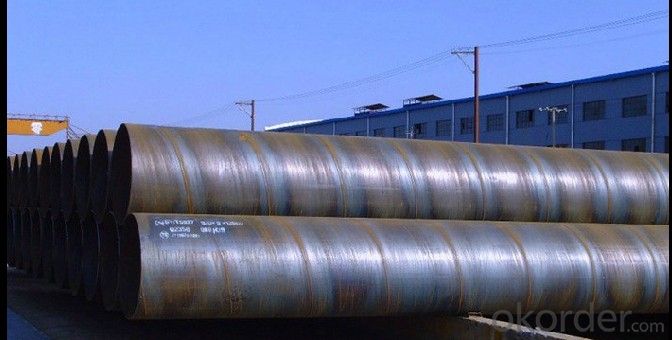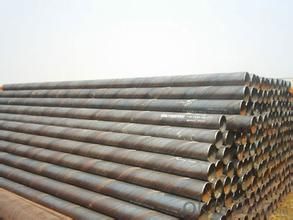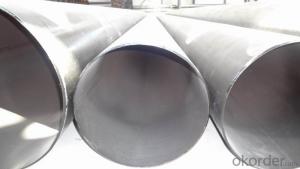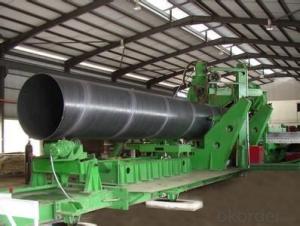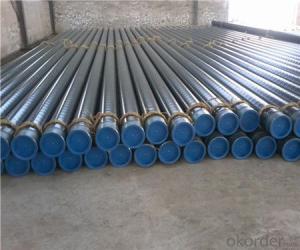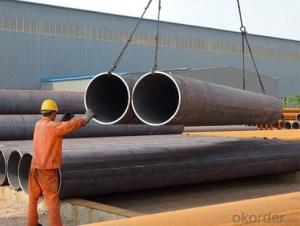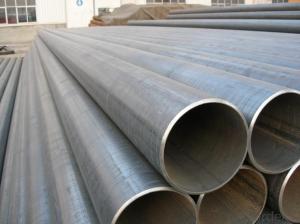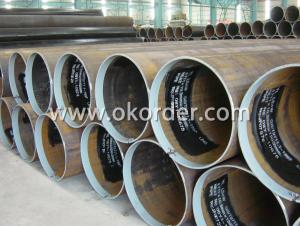API 5L Gr.B SSAW Spiral Pipe
- Loading Port:
- China Main Port
- Payment Terms:
- TT or LC
- Min Order Qty:
- 25-35 m.t.
- Supply Capability:
- -
OKorder Service Pledge
OKorder Financial Service
You Might Also Like
Quick Details
Thickness: | 6 - 28 mm | Section Shape: | Round | Outer Diameter: | 219 - 3500 mm |
Place of Origin: | Tianjin (Mainland) | Secondary Or Not: | Non-secondary | Application: | Oil Pipe |
Technique: | SAW | Certification: | API | Surface Treatment: | as per your request,Black/Blue 3PE or as per your request |
Special Pipe: | API Pipe | Alloy Or Not: | Non-alloy | ||
Certificate: | ISO 9001:2008, API, SGS, BV | Material: | Q235A/B,Q345,L360 and X42-X80 grade | Package: | In bulk or bundles |
Usage: | structure pipe | Main market: | all over the world | Product name: | SSAW Spiral Steel Tube |
End: | Beveled End |
FAQ of SSAW Spiral Pipe:
①How is the quality of your products?
Our products are manufactured strictly according to national and internaional standard, and we take a test on every pipe before delivered out. If you want see our quality certifications and all kinds of testing report, please just ask us for it.
Guaranteed: If products’ quality don’t accord to discription as we give or the promise before you place order, we promise 100% refund.
②How about price?
Yes, we are factory and be able to give you lowest price below market one, and we have a policy that “ for saving time and absolutely honest business attitude, we quote as lowest as possible for any customer, and discount can be given according to quantity”,if you like bargain and factory price is not low enough as you think, just don’t waste your time.Please trust the quotation we would give you, it is professional one.
③Why should you chose us?
Chose happens because of quality, then price, We can give you both.Additionally, we can also offer professional products inquiry, products knowledge train(for agents), smooth goods delivery, exellent customer solution proposals.
SSAW Spiral Pipe Images:
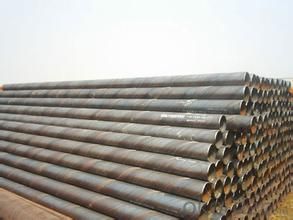
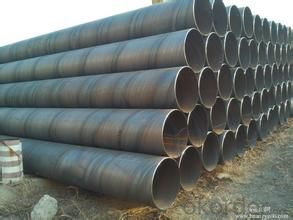
- Q: Can steel pipes be used for HVAC systems?
- Yes, steel pipes can be used for HVAC systems. Steel pipes are commonly used in HVAC systems for their durability, strength, and resistance to corrosion. They are particularly suitable for high-pressure applications and provide reliable and long-lasting performance in HVAC installations.
- Q: What is the purpose of pipe flanges in steel pipes?
- The purpose of pipe flanges in steel pipes is to provide a connection point between two pipe sections, allowing for easy assembly, disassembly, and maintenance of the pipeline. Flanges also help to create a leak-proof seal, enhance the strength and stability of the joint, and provide flexibility for expansion and contraction of the pipes.
- Q: Difference between cold rolled steel pipe and common steel pipe
- 3, the caliber of cold-rolled steel tube is smaller than that of hot rolled steel tube4, from the price point of view, cold-rolled steel pipe is 1000-2000 tons more expensive than hot-rolled steel pipe
- Q: How are steel pipes used in the manufacturing of railways?
- Steel pipes are commonly used in the manufacturing of railways for various purposes. They are used for the construction of railway tracks, providing a strong and durable foundation. Steel pipes are also used in the manufacturing of railway bridges and tunnels, ensuring structural integrity and support. Additionally, steel pipes are utilized for the transportation of fluids and gases within the railway system, such as fuel or water.
- Q: What are the different factors affecting the flow rate of steel pipes?
- There are several factors that can affect the flow rate of steel pipes, including the diameter and length of the pipe, the viscosity and temperature of the fluid being transported, the pressure difference across the pipe, and any obstructions or irregularities in the pipe's interior surface. Additionally, the type of fluid being transported and its flow characteristics, such as laminar or turbulent flow, can also impact the flow rate of steel pipes.
- Q: Can steel pipes be used for underground heating systems?
- Yes, steel pipes can be used for underground heating systems. Steel is a durable and robust material that can withstand the pressure and temperature requirements of heating systems. Additionally, steel pipes are resistant to corrosion, which is crucial for underground applications where exposure to moisture and other elements is common.
- Q: What is the role of steel pipes in the transportation of water?
- Steel pipes play a crucial role in the transportation of water due to their durability and strength. They are widely used in various water supply systems, including municipal water distribution networks, irrigation systems, and industrial water transportation. One of the main advantages of steel pipes is their ability to withstand high pressure and provide a reliable conduit for the transportation of water over long distances. The strength of steel allows for the construction of pipelines with larger diameters, enabling the efficient movement of large volumes of water. Steel pipes are also highly resistant to corrosion, which is essential when transporting water that may contain various minerals, chemicals, or contaminants. The corrosion-resistant properties of steel pipes ensure the water quality remains uncompromised throughout the transportation process. Moreover, steel pipes offer excellent structural integrity, making them suitable for underground and above-ground installations. They can withstand extreme weather conditions, seismic activity, and heavy loads, ensuring the longevity and reliability of the water transportation system. In addition to their strength and durability, steel pipes are also easy to install and maintain. They can be welded together, allowing for a seamless pipeline with minimal leakage points. Regular inspections and maintenance can help identify any potential issues or damages, ensuring the uninterrupted flow of water. Overall, steel pipes play a vital role in the transportation of water by providing a robust and reliable conduit. Their ability to withstand high pressure, resist corrosion, and maintain water quality makes them an ideal choice for various water supply systems, contributing to the efficient and sustainable distribution of water resources.
- Q: How do you join steel pipes together?
- There are several methods to join steel pipes together. The most common methods include welding, threading, and using mechanical connectors. Welding involves melting the ends of the pipes and fusing them together, creating a strong and permanent joint. Threading involves cutting threads into the ends of the pipes and using threaded fittings to connect them. Mechanical connectors, such as couplings or flanges, use fasteners or compression to hold the pipes together. The choice of joining method depends on the specific application and the type of steel pipes being used.
- Q: What is the maximum length of a steel pipe?
- The maximum length of a steel pipe can vary depending on various factors such as the manufacturing process, transportation constraints, and practical limitations. However, steel pipes can typically be manufactured and transported in lengths ranging from a few meters to several hundred meters.
- Q: How are steel pipes used in the construction of water treatment plants?
- Steel pipes are widely used in the construction of water treatment plants due to their numerous advantages and suitability for this specific application. These pipes are utilized in various ways to ensure the efficient and reliable functioning of water treatment facilities. Firstly, steel pipes are commonly used in the transportation of water from its source to the treatment plant. They are highly durable and can withstand high pressure, ensuring the safe and secure delivery of water over long distances. Steel pipes are also resistant to corrosion, which is crucial in preventing contamination of the water supply. Within the treatment plant, steel pipes are used in the distribution system to transport water to different treatment processes. They are often laid underground or within the facility's infrastructure, ensuring a seamless flow of water between different treatment units. Steel pipes are known for their high strength and structural integrity, making them suitable for this purpose. Furthermore, steel pipes are used in the construction of various water treatment equipment. For instance, they are utilized in the construction of sedimentation tanks, where water is allowed to settle, and impurities are removed. Steel pipes are also used in the construction of filtration systems, where water passes through different layers of filters to remove contaminants. Another important application of steel pipes in water treatment plants is in the construction of pumping stations. These stations are responsible for maintaining the water flow throughout the treatment process. Steel pipes are employed in the design and construction of the pumping systems to ensure the efficient movement of water between different stages of treatment. In summary, steel pipes play a crucial role in the construction of water treatment plants. They are used for the transportation of water, distribution within the facility, construction of treatment equipment, and in the design of pumping stations. Their durability, resistance to corrosion, and high strength make them an ideal choice for this critical infrastructure.
Send your message to us
API 5L Gr.B SSAW Spiral Pipe
- Loading Port:
- China Main Port
- Payment Terms:
- TT or LC
- Min Order Qty:
- 25-35 m.t.
- Supply Capability:
- -
OKorder Service Pledge
OKorder Financial Service
Similar products
Hot products
Hot Searches
Related keywords
